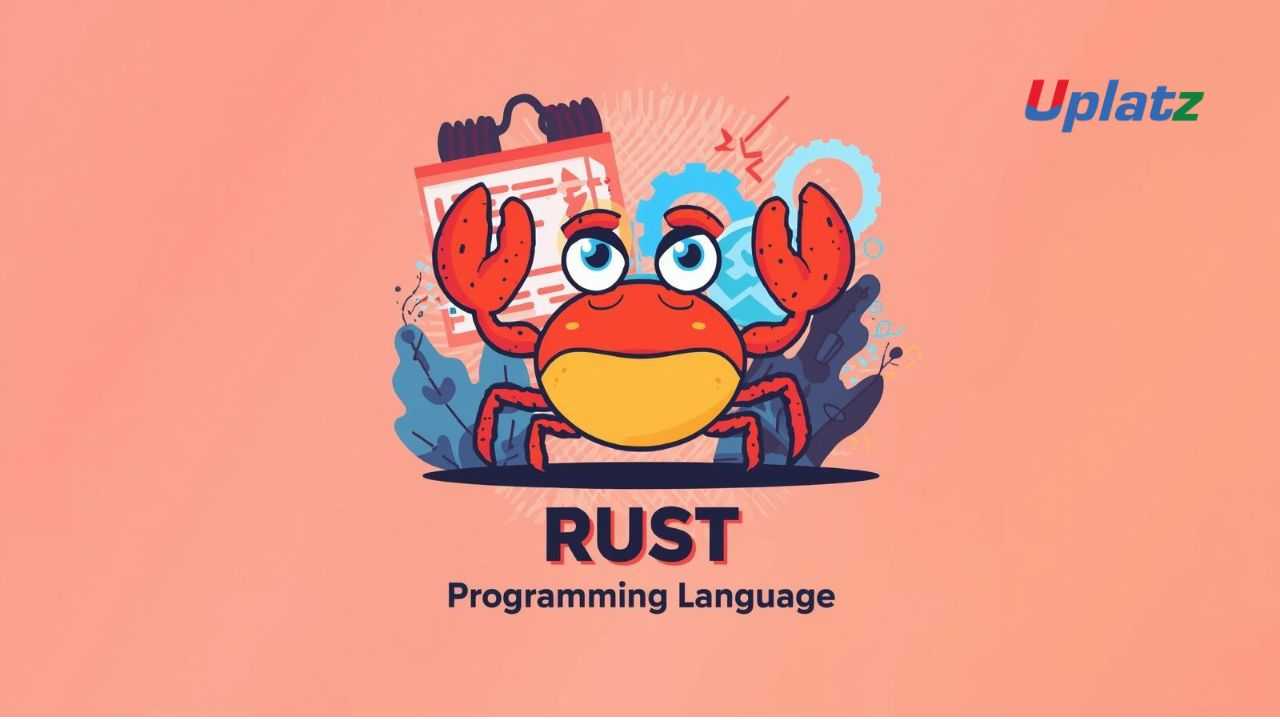Rust Programming Language
Master Rust for safe, fast, and concurrent system programming across modern software environments. Price Match Guarantee
Full Lifetime Access
Access on any Device
Technical Support
Secure Checkout
Course Completion Certificate
Price Match Guarantee
Full Lifetime Access
Access on any Device
Technical Support
Secure Checkout
Course Completion Certificate
 91% Started a new career
BUY THIS COURSE (
91% Started a new career
BUY THIS COURSE (GBP 12 GBP 29 )-
 82% Got a pay increase and promotion
82% Got a pay increase and promotion
Students also bought -
-

- C and Embedded C Programming
- 10 Hours
- GBP 29
- 157 Learners
-

- Dart & Flutter
- 18 hours
- GBP 29
- 494 Learners
-

- React Native
- 20 Hours
- GBP 29
- 2788 Learners

Learn Rust programming from the ground up and master one of the most reliable, high-performance, and future-ready languages used by global tech leaders.
The Rust Programming Language course is a comprehensive, hands-on program designed for developers who want to build safe, concurrent, and efficient applications without compromising performance. Rust stands out as a modern systems programming language that combines the control and power of C/C++ with the safety and simplicity of modern programming paradigms.
In this course, you’ll gain a complete understanding of how Rust works, from its unique ownership and borrowing system to multi-threaded concurrency, memory management, and asynchronous programming. With practical projects, you’ll learn how to write production-grade code that is fast, reliable, and memory-safe — the very reason Rust has become the language of choice for systems, backend, embedded, and blockchain development.
🔹 What Is Rust Programming Language?
Rust is a statically typed, compiled systems programming language developed by Mozilla Research. It was designed to eliminate common programming errors like segmentation faults, null pointer dereferences, and data races — issues that have traditionally plagued low-level programming languages.
Unlike garbage-collected languages, Rust manages memory at compile time using its ownership and borrowing rules. This means you can achieve C-level performance while maintaining guaranteed memory safety. Rust also includes an advanced package manager (Cargo) and module ecosystem (Crates.io) that make it simple to build, test, and manage projects efficiently.
In short, Rust gives developers fine-grained control over system resources while protecting them from common pitfalls. It’s fast, reliable, and secure — a combination that makes it ideal for modern development environments.
🔹 How Does Rust Work?
Rust compiles code directly to machine language, allowing it to run with minimal runtime overhead. At the heart of Rust’s design is its ownership model, a system that tracks how memory is allocated and freed without the need for a garbage collector.
This model ensures thread safety and data integrity by enforcing strict compile-time checks. You cannot accidentally access invalid memory or create race conditions. The compiler guarantees that once your code runs, it’s both safe and efficient.
Rust also integrates pattern matching, algebraic data types (enums and structs), and zero-cost abstractions, which give you expressive power without sacrificing performance. In addition, Cargo, Rust’s build system, handles dependencies, testing, and documentation — simplifying the entire development workflow.
🔹 How Is Rust Used in the Industry?
Rust has rapidly moved from being a niche systems programming tool to a mainstream development language embraced by some of the world’s most influential companies.
-
Mozilla used Rust to develop key components of the Firefox browser.
-
Microsoft integrates Rust in its system-level code to improve security and memory management within Windows and Azure infrastructure.
-
Amazon Web Services (AWS) uses Rust for cloud services like Firecracker, the microVM technology that powers AWS Lambda and Fargate.
-
Dropbox and Cloudflare use Rust to enhance performance and stability in data storage and web networking systems.
-
The Blockchain and Web3 ecosystem heavily relies on Rust, particularly in frameworks like Solana, Polkadot, and Near Protocol.
From embedded systems and IoT devices to web servers and game engines, Rust is proving indispensable for developers who value performance and reliability.
🔹 Benefits of Learning Rust
Learning Rust opens up a wide range of career opportunities in systems programming, cloud infrastructure, DevOps engineering, embedded development, and backend services. Here are key reasons why mastering Rust is a smart career move:
-
Memory Safety Without Garbage Collection – Rust prevents common bugs like buffer overflows and dangling pointers while maintaining full control over resource management.
-
Performance Comparable to C/C++ – You can achieve near-native speed with the safety of modern programming constructs.
-
Concurrency and Parallelism – Rust’s ownership model ensures thread-safe concurrency, allowing developers to build scalable, multi-threaded systems confidently.
-
Growing Industry Adoption – With giants like Microsoft, Amazon, and Meta investing in Rust, the demand for skilled Rust developers is rapidly increasing.
-
Open Source and Community Driven – The Rust ecosystem is supported by an active community, rich documentation, and thousands of open-source crates.
-
Versatility Across Domains – Rust is used for web servers, command-line tools, blockchain protocols, microcontrollers, and more.
In essence, Rust bridges the gap between system-level control and modern software safety, making it a must-learn language for today’s and tomorrow’s developers.
🔹 What Makes Rust Unique?
Rust stands apart from other programming languages through its fearless concurrency model and zero-cost abstractions.
Traditional languages like C++ rely on manual memory management, which often leads to unsafe behavior. High-level languages like Python or JavaScript, on the other hand, handle memory automatically but come with a performance cost. Rust eliminates this trade-off by ensuring safety without a runtime or garbage collector.
Additionally, Rust’s error-handling system (using Result and Option types) encourages developers to handle failures explicitly, leading to more robust applications. Its ownership system enforces strict discipline in code design, resulting in fewer bugs and cleaner architecture.
Rust’s syntax is elegant yet powerful — making it accessible to both seasoned C/C++ developers and modern programmers coming from languages like Python or Go.
🔹 Why Rust Is the Future of Systems Programming
In a world that demands high-performance yet secure software, Rust offers the perfect solution. It’s being adopted not just for low-level systems but also for cloud-native, WebAssembly (WASM), and AI-based applications.
With major organizations like the Linux Foundation, Google, and Meta supporting Rust as part of their secure coding initiatives, the language has moved from experimentation to mainstream adoption.
Rust’s ecosystem continues to expand, with frameworks like:
-
Rocket and Actix Web for web development
-
Tokio for async programming
-
Serde for data serialization
-
Bevy for game development
-
Tauri for building desktop applications
This rapid growth means developers who master Rust today are preparing for high-value, future-proof roles in tech.
🔹 Course Overview
This Rust Programming Language course by Uplatz provides a structured path from beginner to advanced level. You’ll begin with the fundamentals of variables, control flow, and data types before exploring advanced topics like ownership, lifetimes, concurrency, and asynchronous programming.
Through interactive examples and real-world projects, you’ll build:
-
A command-line text processor,
-
A multi-threaded file indexer, and
-
A REST API using Actix Web.
You’ll also learn how to use Cargo for project management, Crates.io for dependency handling, and explore Rust’s testing and documentation tools.
By the end of this course, you will have gained the ability to:
-
Design safe and high-performance applications
-
Implement asynchronous and multi-threaded programs
-
Integrate Rust with existing tech stacks and tools
Whether you’re an experienced developer or an aspiring programmer, this course empowers you to code fearlessly and efficiently with Rust.
By the end of this course, learners will be able to:
- Understand Rust’s syntax, data types, and core concepts.
- Apply ownership, borrowing, and lifetimes to manage memory safely.
- Implement control flow, pattern matching, and error handling.
- Build and manage projects using Cargo and modules.
- Work with collections, iterators, and generics effectively.
- Write concurrent and asynchronous Rust programs.
- Develop REST APIs and backend services using frameworks like Actix or Rocket.
- Optimize system performance with profiling and benchmarking.
- Integrate Rust with other languages via FFI (Foreign Function Interface).
- Build production-grade applications with testing, packaging, and deployment.
Course Syllabus
Module 1: Introduction to Rust and Setup
Overview, installation, and configuration of Rust and Cargo.
Module 2: Rust Basics and Data Types
Variables, constants, data types, mutability, and shadowing.
Module 3: Ownership, Borrowing, and Lifetimes
Memory management, the borrow checker, and lifetime annotations.
Module 4: Control Flow and Pattern Matching
Conditional statements, loops, and advanced pattern matching with enums.
Module 5: Functions, Modules, and Crates
Defining functions, modules, and dependency management using Cargo and Crates.io.
Module 6: Structs, Enums, and Traits
Modeling data with structs, defining enums, and implementing traits.
Module 7: Error Handling and Option Types
Using Result, Option, and error propagation for reliable code.
Module 8: Collections, Iterators, and Generics
Working with vectors, hash maps, and implementing generic functions.
Module 9: Concurrency and Async Programming
Threads, channels, async/await, and concurrency primitives in Rust.
Module 10: Building Web Applications in Rust
Developing APIs using Actix Web or Rocket; integrating with databases.
Module 11: Performance and Integration
Profiling, optimization, FFI integration with C/C++, and WebAssembly.
Module 12: Capstone Project – End-to-End Rust Application
Design, develop, and deploy a production-grade Rust project (CLI, API, or embedded system).
Upon completion, learners will receive a Certificate of Mastery in Rust Programming Language from Uplatz.
This certification validates your proficiency in writing memory-safe, concurrent, and high-performance applications in Rust. It demonstrates your ability to design efficient systems without compromising safety — a key requirement in embedded systems, cloud infrastructure, and cybersecurity.
Earning this certification proves that you:
- Understand Rust’s ownership and concurrency principles in depth.
- Can architect, implement, and optimize large-scale Rust applications.
- Are capable of integrating Rust within modern technology stacks (e.g., WebAssembly, Python, C++).
This credential positions you as a systems programming professional equipped for modern challenges in cloud computing, blockchain, and AI infrastructure — domains where reliability and speed matter most.
With the rise of performance-critical software, Rust developers are in high demand across multiple domains:
- System Software Engineer
- Backend Developer (Rust)
- Blockchain Developer
- Embedded Systems Engineer
- WebAssembly Developer
- Cloud Infrastructure Engineer
Rust’s safety, performance, and growing ecosystem make it a valuable skill for building the next generation of software systems—from high-frequency trading platforms to next-gen OS kernels.
- What is Rust and why is it popular?
Rust is a system programming language focusing on safety, speed, and concurrency, eliminating common memory bugs at compile time. - Explain Rust’s ownership model.
Ownership ensures that each piece of data has a single owner, preventing memory leaks and data races. - What are borrowing and lifetimes?
Borrowing allows temporary access to data without transferring ownership; lifetimes ensure valid references at compile time. - How does Rust handle memory management?
Through compile-time checks using ownership and borrowing rules instead of garbage collection. - What are Traits in Rust?
Traits define shared behavior similar to interfaces in other languages. - What’s the difference between Result and Option types?
Option handles the presence or absence of a value; Result handles success or failure in operations. - What are the benefits of using Cargo?
Cargo manages dependencies, builds projects, and handles testing, packaging, and documentation. - How is concurrency handled in Rust?
Rust ensures thread safety at compile time using ownership and type checks, preventing data races. - What are some real-world applications of Rust?
Operating systems, game engines, web servers, blockchain platforms, and compilers. - What makes Rust safer than C++?
Rust enforces memory safety, thread safety, and type checking during compilation, reducing runtime vulnerabilities.









